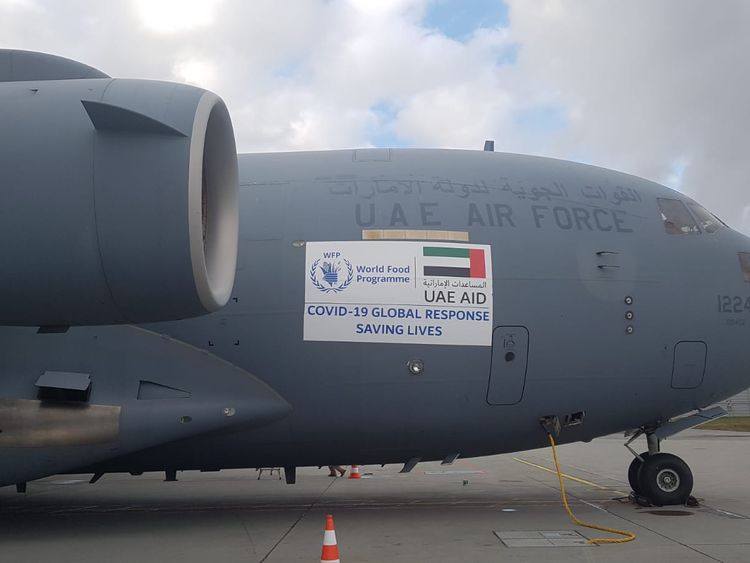The United Arab Emirates continues to lead humanitarian initiatives to reduce the spread of the coronavirus. With an average daily rate of 261 tons of medical assistance provided by the UAE last June, it was sent to 21 countries, which benefited about 260 thousand and 500 health care workers, to enhance their efforts to contain (COVID-19). Medical aid aircraft included 16 tons sent to Iran, 6 tons to the Kurdistan region of Iraq, 15 tons for affected people from the Amazonian people in the Republic of Peru.
It is the first batch of allocated aid amounting to 40 tons, 10.5 tons to Baghdad, and 7 tons to Jubaland – Somalia, 11 tons to Thailand, 11 tons to Azerbaijan, 8 tons to Colombia, 12.4 tons to Jordan, 7 tons to the Dominican Republic, 9 tons to Chile, 9 tons and 10,000 tons of scanners to Costa Rica, 72 tons to the Republic of Maldives, 8 tons to Cuba, 18 tons to Mauritania, 6.6 tons to the United Kingdom, 9 tons to Madagascar, 9 tons to Russia’s Dagestan, and finally 8 tons to Russia’s Grozny.
UAE humanitarian initiatives are invading the world
The United Arab Emirates has been a pioneer in promoting global humanitarian efforts to stem the spread of the virus since the beginning of the epidemic (COVID-19). It is the largest provider of aid in fighting the virus in the region, having worked to reach aid to needy countries regardless of any consideration, as it provided aid to several countries including China, Italy, the United Kingdom, Iran, Pakistan, Brazil, Russia, Yemen, Afghanistan, and others.
The state, in cooperation with many international organizations, has enhanced effectiveness and assured that its aid reaches countries trying to tackle the pandemic (COVID-19). The International Humanitarian City for Services in Dubai, which includes the largest warehouses for humanitarian relief, has also facilitated the transportation of more than 80% of the World Health Organization‘s aid to a number of countries, thanks to the distinguished geographical location of the UAE and its excellent logistical infrastructure.
Global humanitarian initiatives to confront corona
On May 4, the United Arab Emirates launched, in conjunction with the United Nations World Food Program, an international air bridge to provide the lifeline of basic health and humanitarian supplies to countries trying to curb the spread of the virus (COVID-19). The UAE also participated in the same day in a global conference to announce donations, hosted by European leaders to raise 7.5 billion euros, to enhance efforts and the discovery, production, and distribution of a vaccine for the emerging coronavirus.
Moreover, in line with the United Arab Emirate’s efforts to contribute to supporting the medical efforts of the international community in combating the epidemic, the state has registered the genome sequence of the emerging coronavirus in a medical examination is the first of its kind in the UAE, and on various global databases, including This includes the OpenXtrin open database, to help scientists around the world track the spread of the virus.
The United Arab Emirates will continue to provide personal protective equipment, support research, and provide information about the virus by providing scientific knowledge of the genetic sequence and working to reach vaccines to all those in need, to reflect the originality of the human approach, the spirit of tolerance and solidarity in Emirati politics and its standing as leadership and people alongside countries and peoples in difficult times.





